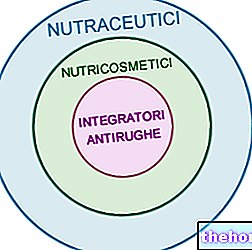What is Erythritol
Erythritol is a 4-carbon polyol naturally occurring in products of plant origin, such as fruit, and industrially extracted from plant sugars subjected to intensive bacterial fermentation processes in specific bioreactors.

Commonly indicated on the label with the initials E968, the "€ ™ Erythritol has recently jumped to the honors of the Italian news following the marketing by the company Eridania of an innovative sugar defined with the initials ES50 consisting for half of Erythritol and for half from Fructose, therefore characterized by advantageous caloric and metabolic properties compared to the common sucrose while retaining comparable organoleptic characteristics.
Nutritional characteristics and flavor
Among the reasons that have prompted the greater use of Erythritol as a sweetener, in recent years there are certainly its nutritional and organoleptic characteristics characterized by:
- Limited caloric intake: about 0.2 Kcal per gram;
- Glycemic index equal to Zero;
- Sweetening power estimated at 60 - 80% of the common sucrose;
- Absence of the characteristic aftertaste typical of synthetic or semi-synthetic sweeteners.
Added to these are also the metabolic characteristics, which prevent Erythritol from accumulating in the intestinal lumen, thus limiting the appearance of diarrhea and crampy abdominal pain, allowing instead its intestinal absorption and consequent elimination via the kidneys.
Benefits of € ™ Erythritol
In light of the aforementioned characteristics, it is easy to understand how the use of Erythritol can guarantee significant advantages, both compared to common table sugar and compared to various synthetic and semi-synthetic sweeteners, thus facilitating their consumption both in the dietary-nutritional and culinary fields. .
Advantages over table sugar
- Reduced energy intake, estimated at around 0.2 Kcal per gram of product, which allows to reduce the caloric content associated with the consumption of sugar or products sweetened with sucrose, thus making it suitable during low-calorie and hypoglucidic dietary protocols.
- Glycemic index equal to zero, such as to avoid glycemic peaks linked to the consumption of sugar, thus making it ideal in diabetic patients or in patients with impaired glucose metabolism for which it is necessary to reduce the glycemic load of the various meals.
- Reduced cariogenic activity, which preserves the oral cavity from bacterial colonization and related pathological consequences, often painful.
Advantages over synthetic sweeteners
The most relevant are represented by:- Reduced risk of diarrhea and cramping abdominal pain, given the ability of Erythritol to be readily absorbed by the intestinal mucosa, to be subsequently excreted via the kidneys, thus avoiding the accumulation and consequent recall of water in the intestinal lumen .
- Potential antioxidant role of "€ ™ Erythritol, as observed in some experimental studies, which would protect the intestinal mucosa primarily, from the oxidizing action of reactive oxygen species responsible for the oxidative deterioration of cellular structures and loss of function barrier.
- Reduced irritative role towards the intestinal mucosa.
- Absent bitter aftertaste, typical of sugar alcohols, which allows the use of this sugar also in the preparation of common desserts or dishes.
Recipes
Sugar Free Diabetics Tart with Erythritol
Without sugar, without butter, with wholemeal flour instead of 00, but absolutely tasty and crumbly. Also thanks to the erythritol, which in this video recipe replaces sugar to create an appetizing tart also suitable for the diet of diabetics.
Strawberry tart for diabetics - Light tart without butter and without sucrose
Problems with playing the video? Reload the video from youtube.
- Go to the Video Page
- Go to the Video Recipes Section
- Watch the video on youtube
Want a light, low-calorie, sugar-free pudding sweetened with erythritol? We have this too! Try our video recipe Pudding with Strawberries and Yogurt for Diabetics or visit the section of the site dedicated to Video Recipes for Diabetics and all the recipes with erythritol.
Disadvantages
Erythritol: only benefits?
Although the advantages related to the use of this sugar in everyday life are evident, as observed and demonstrated in numerous studies, it would be appropriate to consider, for a correct evaluation, also the potential limits.
Leaving aside some unfounded fears, such as the pro-tumor fears of "€ ™ Erythritol, which do not find scientifically valid evidence in the literature to date, it would be important to focus on the laxative potential of this sugar, which while representing an advantage over other sweeteners, limits it. l "€ ™ use in beverages due to the high risk of exceeding the tolerable threshold.
In this regard, a recent study conducted on the pediatric population, therefore the one potentially most susceptible to intestinal side effects of "€ ™ Erythritol, showed how the intake of 25 g compared to 5 or 15 g of Erythritol per day can determine a significant increase in diarrheal episodes and in the number of daily bowel movements.
Bringing everything back to the adult population, well tolerable daily doses of Erythritol are those between 0.5 and 1 g per kg of body mass, beyond which it would not be advisable to exceed.
Other Foods - Sweeteners Acesulfame K Aspartame Sugar beet Sugar cane Sodium cyclamate Dextrose Sweeteners Erythritol Fructose Maltose Mannitol Molasses Saccharin Saccharose Maple syrup Agave syrup Fructose syrup Glucose syrup Sugar sorbitol Articles Stevia Sucralitol sugar SWEETENERS Categories Alcoholic Foods Meat Cereals and derivatives Sweeteners Sweets Offal Fruit Dried fruit Milk and Legumes Oils and Fats Fish and fishery products Salami Spices Vegetables Health recipes Appetizers Bread, Pizza and Brioche First courses Second courses Vegetables and Salads Sweets and Desserts Ice cream and sorbets Syrups, liqueurs and grappas Basic Preparations ---- In the Kitchen with leftovers Carnival recipes Christmas recipes Light diet recipes tici Recipes for the Holidays Recipes for Valentine's Day Vegetarian Recipes Protein Recipes Regional Recipes Vegan Recipes

.jpg)

.jpg)
























